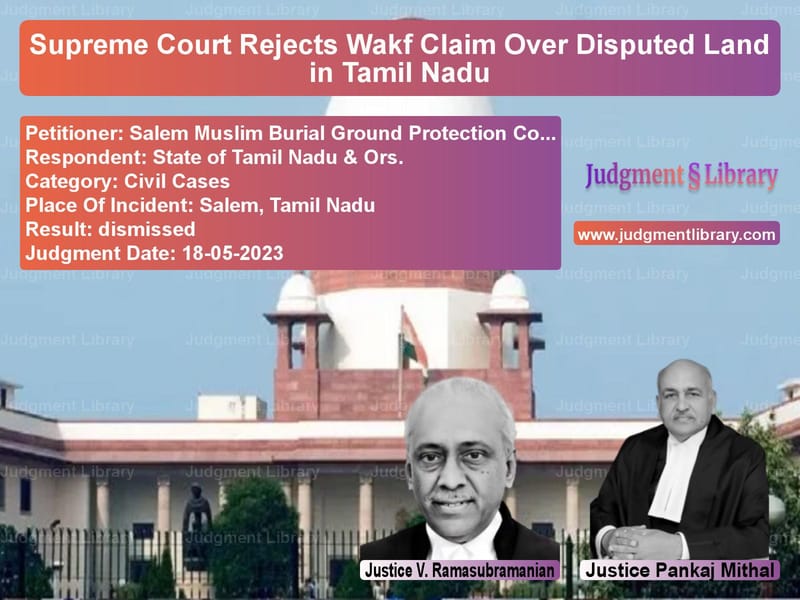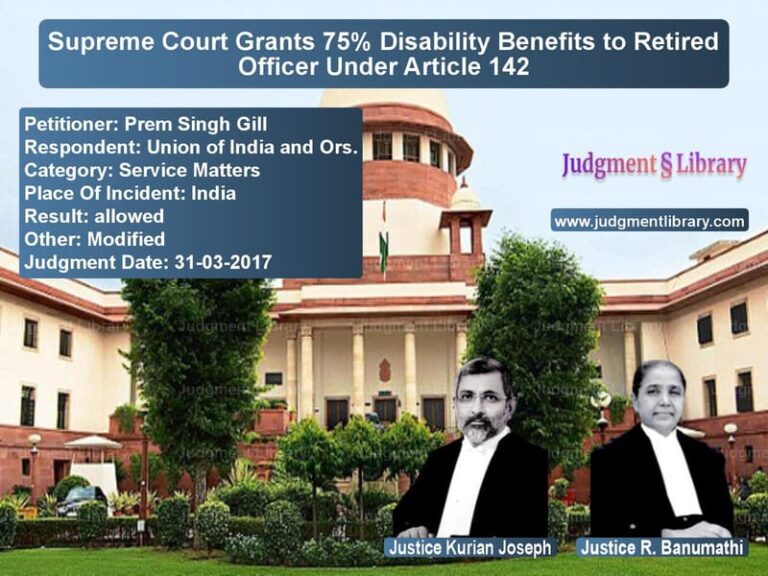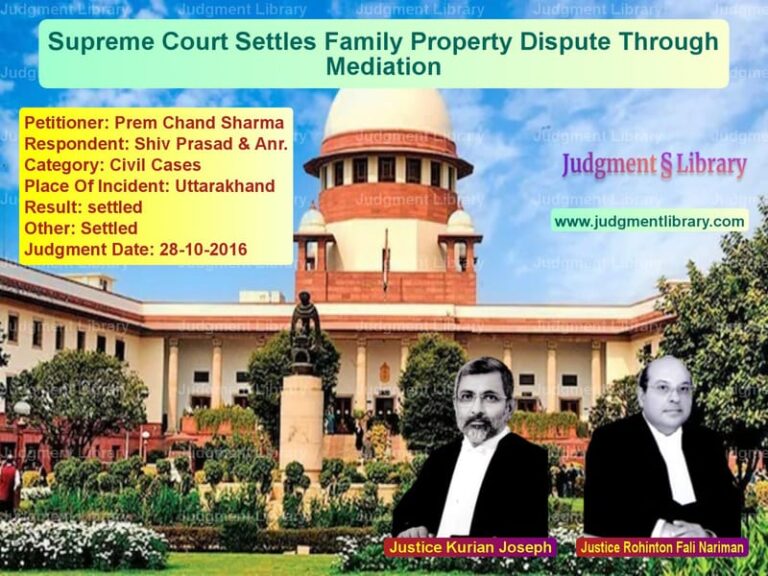Supreme Court Rejects Wakf Claim Over Disputed Land in Tamil Nadu
The case of Salem Muslim Burial Ground Protection Committee vs. State of Tamil Nadu revolves around a long-standing land dispute concerning the status of a parcel of land in Salem. The primary question before the Supreme Court was whether the land in question qualified as Wakf property by dedication or long-standing use. The Court ultimately ruled against the Wakf claim, affirming the rights of private occupants.
Background of the Case
The dispute centered on land located in Zamin Survey Nos. 5105 and 5108 in Salem Zameen Estate. This land, previously recorded as burial ground paramboke, had been closed by municipal authorities in 1867 due to health concerns. The municipality had then allotted an alternative site for use as a burial ground.
Over time, various individuals claimed possession of the land:
- Perumal Chettiar asserted that the land had been assigned to him by the Zamindar of Salem in 1935 and that he had received pattas (title deeds) in support of his claim.
- A. Ramaswamy Chettiar claimed to have purchased portions of the land from multiple sellers in 1954.
- The Salem Muslim Burial Ground Protection Committee argued that the land had always been used as a burial ground and thus constituted a Wakf property.
The dispute led to multiple inquiries under the Tamil Nadu Estate (Abolition & Conversion into Ryotwari) Act, 1948. The Assistant Settlement Officer (ASO) rejected all claims in 1959, ruling that the land was communal in nature and could not be privately assigned.
Multiple appeals were filed by the claimants, but the decisions were upheld by higher authorities, including the Board of Revenue. Eventually, the claimants challenged these rulings through writ petitions in the Madras High Court.
High Court Rulings
The Single Judge of the High Court ruled in favor of the Wakf Committee in 2005, declaring the land as Wakf property. However, the Division Bench of the High Court overturned this decision in 2009, holding that:
- The land had never been used for burials for over a century.
- The Muslim community had already been allotted an alternative burial site.
- The claimants had valid records of possession.
- The alleged Wakf notification of 1959 was not supported by proper surveys or records.
The Salem Muslim Burial Ground Protection Committee then appealed to the Supreme Court.
Petitioner’s Arguments (Wakf Committee)
The Wakf Committee, represented by senior counsel, argued:
- Once a Wakf is created, it remains Wakf property forever, regardless of current use.
- The land had been used as a burial ground historically, making it Wakf by user.
- The High Court failed to recognize the notification declaring the land as Wakf property.
- The land could not have been assigned to private individuals, as it was meant for religious purposes.
Respondent’s Arguments (State of Tamil Nadu & Private Occupants)
The respondents countered:
- There was no evidence of any formal dedication of the land as Wakf property.
- The Wakf notification of 1959 was issued without proper surveys and could not be treated as conclusive proof.
- The land had been treated as a rudrabhoomi (Hindu cremation ground) rather than a Muslim burial ground.
- The Muslim community had ceased using the land for burials as early as 1867.
- The Wakf Board had never actively asserted its claim over the land until the dispute arose in the 1990s.
Supreme Court’s Observations
The Supreme Court made several key observations:
- Wakf by dedication requires clear evidence of express dedication, which was absent in this case.
- Wakf by user can only be established if there is continuous and recognized public use, which was not the case here.
- The long period of non-use for burials indicated that the land had lost its character as a burial ground.
- The 1959 notification lacked supporting evidence of surveys or formal government recognition.
Key Judgment Excerpt
The Supreme Court held:
“The mere fact that land was recorded as burial ground at some point does not automatically confer Wakf status upon it, especially when there is a prolonged period of non-use.”
The Court further stated:
“The claim of Wakf property cannot be sustained in the absence of formal dedication, recognized user, or valid government notifications backed by procedural compliance.”
Final Verdict
The Supreme Court dismissed the Wakf Committee’s appeal and upheld the High Court’s ruling, confirming the following:
- The land is not Wakf property and belongs to private claimants.
- The 1959 notification lacks legal validity.
- The Salem Muslim community has already been allotted an alternative burial site.
- The State Government is free to regulate the land’s use as per prevailing laws.
This decision reinforces the importance of proper documentation and long-standing use in asserting Wakf claims, ensuring that land disputes are resolved based on legal principles rather than historical assumptions.
Petitioner Name: Salem Muslim Burial Ground Protection Committee.Respondent Name: State of Tamil Nadu & Ors..Judgment By: Justice V. Ramasubramanian, Justice Pankaj Mithal.Place Of Incident: Salem, Tamil Nadu.Judgment Date: 18-05-2023.
Don’t miss out on the full details! Download the complete judgment in PDF format below and gain valuable insights instantly!
Download Judgment: salem-muslim-burial-vs-state-of-tamil-nadu-supreme-court-of-india-judgment-dated-18-05-2023.pdf
Directly Download Judgment: Directly download this Judgment
See all petitions in Property Disputes
See all petitions in Contract Disputes
See all petitions in Landlord-Tenant Disputes
See all petitions in Judgment by V. Ramasubramanian
See all petitions in Judgment by Pankaj Mithal
See all petitions in dismissed
See all petitions in supreme court of India judgments May 2023
See all petitions in 2023 judgments
See all posts in Civil Cases Category
See all allowed petitions in Civil Cases Category
See all Dismissed petitions in Civil Cases Category
See all partially allowed petitions in Civil Cases Category







